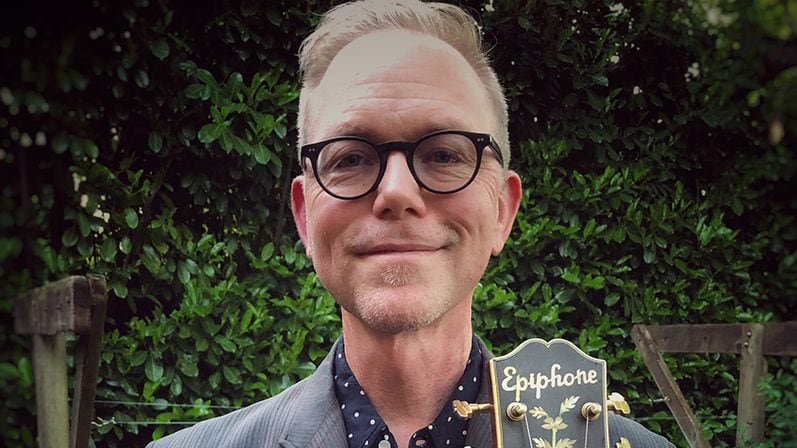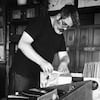It's been nearly 20 years since Portland singer-songwriter Pete Krebs has released an album of original songs under his own name. But that doesn't mean the two-time Oregon Music Hall of Fame inductee has spent the past two decades just sitting around the house—only the last five months.
Until the coronavirus put a halt to all live performances, Krebs, 53, was a fixture at bars around town with regular gigs playing everything from gypsy jazz to country swing to psych folk—a far cry from his days leading Sub Pop-signed indie power trio Hazel in the '90s. When he's not performing, he's teaching guitar to students of all ages, and keeping up his own studies of the instrument.
Related: The Legend of Hazel.
In the time since the release of his last solo album, 2002's Know by Heart, Krebs has also had a lot of personal issues to wrestle with. He was diagnosed with skin cancer in 2013—the second time he's battled cancer in his life— the treatment for which took him out of the game for a number of months.
The impact of his health scare and the loss of loved ones—both blood relatives and members of his musical family—is felt throughout All My Friends Are Ghosts, the new LP by Krebs and his backing band, the Gossamer Wings, out Aug. 29, a day before his 54th birthday.
But the album isn't a despairing one. The warm mix of Tex- Mex country, folk pop and reverb- soaked waltzes is almost defiant in its joy and humility. Of course, Krebs misses his drinking buddies, and the parental figure that inspired the cock-eyed "Brightest Stars," but he knows he'd be doing their memories a disservice by continuing to wallow in their absence.
WW caught up with Krebs in a break between guitar lessons to learn
more about the songs on Ghosts, his lifelong study of the guitar and facing mortality in his 40s.
WW: Was it surprising to realize that it had been almost two decades since you released any new music as Pete Krebs?
Pete Krebs: I mean, it's not like I stopped being a musician. I just felt like I was on a loop and I needed to get out of that loop. So my solution was to take the time to equip myself to be able to play music for a living. Up to that point, I was kind of cobbling it together. I wanted to learn how to play the guitar better and solidify my life a little bit more and…grow up, really. I didn't really want to coast on the fumes of what I had done in my 20s.
Have the songs on All My Friends Are Ghosts been percolating all this while or is this fairly new material?
It's a combination of the two. There's stuff that was taking up room in the attic a little bit. I didn't want to sell it or give it away. I had to use it. Then I was writing literally while we were recording. Just to remind myself that I could write stuff that was coming from a more current perspective. And I was really interested in seeing how well everything dovetailed, and I think it did. There's a continuity that runs all the way through it.
A number of songs on the new album reckon with the deaths of friends and family members. Having dealt with that, as well as your cancer diagnosis in 2013, are you better equipped to deal with your own mortality?
I think so. Everything has an equal and opposite reaction. If you get the shit scared out of you, presumably there's an equivalent positive message in that. It's very liberating to have gone through some of the steps of coming to terms with mortality. Cancer was a big step in shaking my aware- ness about a lot of things. I'm really thankful for that. Do I want to drop dead next week? Not really. I'm having a pretty great time.
Ghosts ends with the song "Be Happy Today." Was it important to wrap up the album on a positive note like that?
My idea was that I'm writing all these songs about these heavy subjects, I think it would be really awesome to write a song that was about as happy as I could make it—with whistling and handclaps and the whole thing. But if you listen to the lyrics, it's still concerned with, "Enjoy it while you can." Regardless of my intent, I'm still wrestling with these ideas of inevitable change, but trying to find a bit more of a hopeful message in that.
You've been studying guitar for some time now. Do you still feel like you have more to learn about your chosen instrument?
Oh, absolutely. It's the kind of thing that you can just dig deeper and deeper and deeper into. You explore this big room and you realize how big the room is. That's one where I wish I was 25 again, so I could have all this extra time to explore. It's never ending and that's what I like about it. I'm lucky enough to have something in my life that really intrigues me on an emotional level and an intellectual level—and that I can pretty much do until my fingers stop working or my brain stops firing.
Do you have any sense of what comes next for you? Are you working on new material or just waiting until things open up and you can start playing gigs again?
For most of my adult life, I played 200 to 250 gigs a year. I've played one gig in the last five and a half months, and that was last night. That really does a number on how you're able to define yourself. When I look to the future, there's enough uncertainty that I just want to focus on what's right in front of me. And that's working with my students and continuing to teach privately and doing my own geeky study of old music and trying to be better at my craft. Learning something without the influence of employment or commerce being part of my decision. Or I'll do something else and go out in a blaze of glory.

